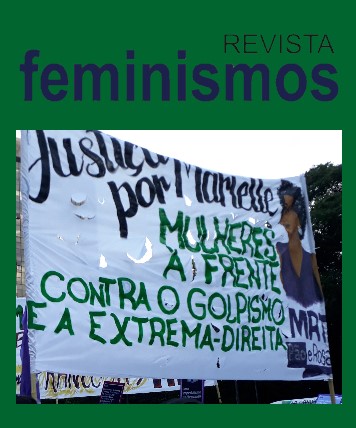POLITICAL PARTIES AND WOMEN ‘S PARTICIPATION IN POLITICS IN WEST AFRICA
DOI:
https://doi.org/10.9771/rf.v9i2.47653Palavras-chave:
Partidos políticos, participação política, patriarcado, política ao estilo masculino, gênero.Resumo
As mulheres nos Estados africanos têm contribuído imensamente para a construção da nação e o desenvolvimento socioeconômico de suas várias sociedades. Apesar disso, isso não se traduziu em mais mulheres ocupando posições de liderança política na África Ocidental. O artigo analisou criticamente o papel que os partidos políticos desempenham na prevenção da ocupação de cargos de liderança política por mulheres. Os partidos políticos em alguns estados da África Ocidental não estão comprometidos com a igualdade de gênero uma vez que estrutura de liderança, a nomeação de candidatos e o financiamento de campanhas são tendenciosos contra as mulheres. A falta de democracia interna, estilo masculino de política e uma abordagem de confronto em vez de buscar colaboração e consenso também são relevantes para a compreensão deste cenário. O patriarcado domina as atividades dos partidos políticos, limitando assim as mulheres, o que perpetua ainda mais a desigualdade de gênero na política. Recomendo que os partidos políticos implementem um sistema de representação proporcional/quota para encorajar mais mulheres a concorrer a cargos eletivos.
Downloads
Referências
ABBA, Sadeeque A.; BABALOLA, Dele. Contending issues in political parties in
Nigeria: The candidate selection process. Journal of Pan African Studies, v. 11, n. 1, p.
-134, 2017.
ADEBAJO, A. A., & AYODEJI, G. I.. Insecurity and women participation in the
electoral processes in Nigeria. Usukka, Nigeria: Nigerian Political Science Association
(NPSA)/University of Nigeria, 2020.
AMADIUME, I.. Gender and political systems and social movements: A West African
experience. In: MANDANI M. (ed). African Studies in Social movement and
democracy. Dakar: CODESRIA, 1994. Pp. 35-68.
BADMUS, Isiaka Alani. Poliitical Parties and Women's Political Leadership in
Nigeria: The Case. Ufahamu: A Journal of African Studies, v. 32, p. 3, 2006.
BAUER, G. (2019). Women in African parliaments: Progress and prospects. In:
YACOB-HALISO, Olajumoke; FALOLA, Toyin (Ed.). The Palgrave Handbook of
African Women's Studies. Springer International Publishing, 2019. Pp. 335-352.
CARTER Centre (2018). Presidential and parliamentary elections in Sierra Leone.
Final Report. 2018
EWOKERI, C. Why Nigeria’s women get a 50% election discount, 2018. Disponível
em: httpps://www.bbc.com/news/world-africa-45450399. Acesso em 6 jun. 2021.
EZEA, S. (2018). high cost of nominations forms, Nigerian youths and challenges of
electioneering. 2018. Disponível em: https://m.guardina.ng/saturday magazine/highcost-
of-nomination-forms, Nigerian- youths- and- challenges- of- electioneering.
Acesso em: 6 jun. 2021.
FALOLA, T.. Writing Nigeria women’s political history. In: YACOB-HALISO,
Olajumoke; FALOLA, Toyin (Ed.). The Palgrave Handbook of African Women's Studies.
CONFERENCE ON GENDER, POLITICS AND POWER: Overcoming the barriers
to the emergence of women political leaders in Nigeria by CSSR & D, Lagos.
OKOOSI-SIMBINE, A.T., & OBI, N. N. Women in political parties in Africa. In:
YACOB-HALISO, Olajumoke; FALOLA, Toyin (Ed.). The Palgrave Handbook of
African Women's Studies. Springer International Publishing, 2019. Pp. 315-334.
OMENMA, J. Tochukwu; ONU, J. Chisolum; OMENMA, Z. Onyinyechi. Factors
Limiting Nomination of Women Candidates for Elections in Nigeria. Mediterranean
Journal of Social Sciences, v. 7, n. 5, p. 202, 2016
ONI, S, & JOSHUA, S. Gender Relations in Nigeria’s Democratic Governance. Journals
of Politics & Governance, v.1.n.2/3 p.4.2012
POGOSON, A. I. Women, political parties and exclusion in Nigeria: 1999-
Political Parties and Democracy in Nigeria, Kuru: NIPSS, 2014. Pp. 237-264.
QUAYE, M. Ghana: Quest for increased female mps - quaye advocates affirmative
action. Disponível em: http/www.peacewomen.org/content>ghana-quest-increasedfemale-
mps-quaye-advocates-affirmative-action.
RAMTOHUL, R.. Women, gender and politics in Africa. In: YACOB-HALISO,
Olajumoke; FALOLA, Toyin (Ed.). The Palgrave Handbook of African Women's
Studies. Springer International Publishing, 2019. Pp. 297-313.
ROGERS, Maseray Ngadie. Women, politics and decision-making in Sierra
Leone. Ghana Journal of Development Studies, v. 8, n. 1, p. 50-71, 2011.
TAWIAH, E.. Can women achieve equal political representation in Ghana? Gender
Centre for Empowering Development. 2018.
TENU, C.. Obstacles to gender parity in political representation: The case of Ghanaian
parliament. Dissertação de mestrado. Department of Political Science, Memorial
University of Newfoundland. 2019.
TRIPP, Aili Marie. Women and politics in Africa. In: NGOM, Fallou. Oxford Research
Encyclopedia of African History. Oxford: Oxford University Press, 2017. Pp. 1-29.
TSIKATA, Dzodzi. Affirmative action and the prospects for gender equality in
Ghanaian politics. Accra: FES, 2009. Disponível em:
https://www.semanticscholar.org. Acesso em: 6 jun. 2021.
Downloads
Publicado
Como Citar
Edição
Seção
Licença
Autoras/es que publicam nesta revista concordam com os seguintes termos:
1. Autoras/es mantém os direitos autorais e concedem à revista o direito de primeira publicação, com o trabalho simultaneamente licenciado sob a Creative Commons Attribution License que permitindo o compartilhamento do trabalho com reconhecimento da autoria do trabalho e publicação inicial nesta revista.
2. Autoras/es têm autorização para assumir contratos adicionais separadamente, para distribuição não-exclusiva da versão do trabalho publicada nesta revista (ex.: em repositório institucional ou como capítulo de livro), com reconhecimento de autoria e publicação inicial nesta revista.
3. Autoras/es têm permissão e são estimuladas/os a publicar e distribuir seu trabalho online (ex.: em repositórios institucionais ou na sua página pessoal) a qualquer ponto antes ou durante o processo editorial, já que isso pode gerar alterações produtivas, bem como aumentar o impacto e a citação do trabalho publicado.

